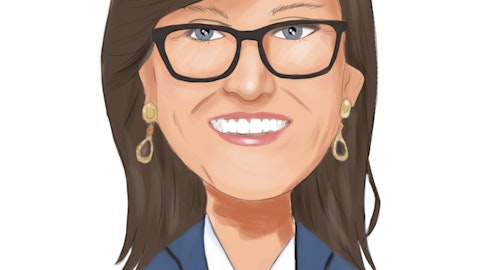Rory Wallace: Got it. And then as far as that Tier 1 Canadian operator, they’ve had a few things come up and it’s not totally shocking to hear that, I guess, they’re pushing out the launch. I just wanted to be clear, are they backing away from offering SECaaS at any point in time? Or is it just that they sort of deferred the launch date to an unknown future date, so you’ve kind of conservatively taken that out of any future projections? And then I think you mentioned they’re still taking DPI equipment from Allot. And I was wondering if that might be part of the reason for the Q3 gross margin being lower, might be that — maybe there was a bundled thought process around how you structure that contract. Just trying to understand because the gross margin, did you say 50% or 60% for Q3, but it’s a lot lower than the gross margin you’ve had in any other quarter.
Ziv Leitman: So I said 50% for Q3, 50% for Q3. There’s no difference between postponing indefinitely to not doing, because it’s subject to change anyway regardless. So, right now, we’re not doing it. That’s how we look at it. In the future, future can be many things. It’s obviously no longer in any of our forecasts. And regarding the Q3 projected margin, it’s very low and it’s related to a mix of a few deals. But beyond that, I don’t want to specify where exactly it’s coming from.
Rory Wallace: Okay. That’s fair. And then with sort of other large opportunity on Vodafone for HomeSecure, I think you mentioned the convergence of mobile and then fixed services. But can you comment any more on the opportunity with Vodafone or any of these other fixed line deals that you’ve won for the HomeSecure product?
Erez Antebi: Like we announced, I don’t remember when, but a while ago, we signed an agreement with Vodafone to launch the HomeSecure product. And that’s — and we’re very hopeful that it will launch and will be successful. I don’t have other comments on that. We’re talking to various other operators, both in Europe and in other places about launching HomeSecure. It’s one of our product lines. We are actively selling it. And I’m not sure I have much more to add beyond that.
Rory Wallace: Okay. And then the operating expense run rate that you mentioned you used Q2, you previously said Q3 would come down from Q2 levels out before this most recent cost reduction actions. So, is there some cushion in that? Or is there a reason why that prior sort of expected step down in the Q3 OpEx level wouldn’t have been happening anyway?
Ziv Leitman: In Q3, as we said, we are going to book the $2 million of one-time [lease] (ph) expenses. And the other expenses should be roughly in the same level as the second quarter.
Rory Wallace: Okay. Got it. And then, in terms of working capital, you had the inventory come up quite a bit. I guess some of that’s going to be related to this, the lower-margin business. But what should we expect from working capital going forward? I mean is your goal going to be to kind of bring back these days of inventory and receivables and payables kind of back to where they were? And that should be a tailwind for cash flow at some point letting alone that $14 million bad debt receivable that’s still sitting out there. I mean is it fair to think that working capital should normalize at some point?
Ziv Leitman: Currently, I wouldn’t take it into account. It can sharply go down, but definitely, it will not be increased further.
Rory Wallace: Okay. Thank you for taking my questions.
Ziv Leitman: Thank you.
Operator: This concludes the question-and-answer session. Mr. Antebi, would you like to make your concluding statement?
Erez Antebi: Yes. I want to thank you all again for joining this call and for asking the questions and participating, and I look forward to talking to you in the next conference call next quarter. Thank you very much.
Operator: Thank you. This concludes the Allot second quarter 2023 results conference call. Thank you for your participation. You may go ahead and disconnect.
Follow Allot Ltd. (NASDAQ:ALLT)
Follow Allot Ltd. (NASDAQ:ALLT)
Receive real-time insider trading and news alerts


